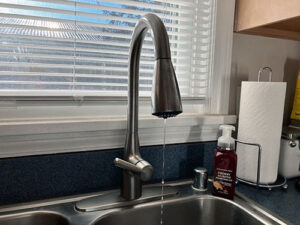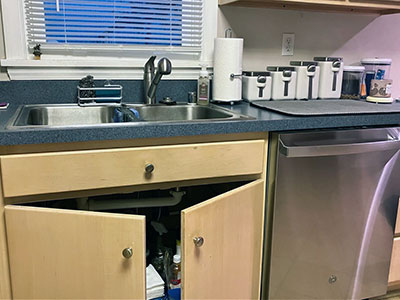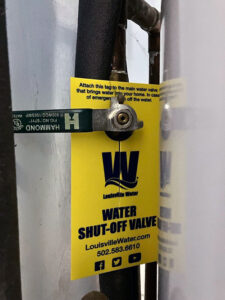 Reaching the 40-degree mark and even 50 degrees next week sounds inviting, but we’re not out of the arctic blast just yet. Louisville Water continues to encourage preventive maintenance to protect your water pipes. Our customer service representatives answered about 100 calls over the holiday weekend from customers reporting “no water”. It turned out that 99% of those calls were frozen plumbing inside the customer’s residence. While Louisville Water can’t repair private plumbing, we’re glad to offer these suggestions to help prevent pipes from freezing and possibly bursting.
Reaching the 40-degree mark and even 50 degrees next week sounds inviting, but we’re not out of the arctic blast just yet. Louisville Water continues to encourage preventive maintenance to protect your water pipes. Our customer service representatives answered about 100 calls over the holiday weekend from customers reporting “no water”. It turned out that 99% of those calls were frozen plumbing inside the customer’s residence. While Louisville Water can’t repair private plumbing, we’re glad to offer these suggestions to help prevent pipes from freezing and possibly bursting.
When temperatures fall below freezing (32 degrees) as they will again this week, it’s a good idea to take some precautions:
- Wrap exposed pipes with insulating material. You can purchase these materials from a hardware store.
- Allow COLD water to drip (about the size of a pencil point) from faucets near exterior facing walls or from faucets close to pipes that are prone to freezing. This small trickle keeps water flowing through the pipes which helps prevent them from freezing. Note: It’s important to keep the amount of running water limited to a small drip. Too much water can add up over time. With that said, paying a few extra dollars a month is nothing compared to the cost and headache of a busted pipe!
- If your home has a crawl space, cover the outside vents to prevent winter winds from freezing the pipes. Remember to turn off outside faucets and disconnect garden hoses.
- If your house has a slab foundation, close the garage door. Some pipes are located under the concrete floors.
 If you are a renter, you might be wondering, what can I do? The answer to that can vary based on whether you live in an apartment complex, duplex, or home. Here are some guidelines:
If you are a renter, you might be wondering, what can I do? The answer to that can vary based on whether you live in an apartment complex, duplex, or home. Here are some guidelines:
- You can still wrap exposed pipes under those kitchen and bathroom sinks if they are near an exterior facing wall or are prone to freezing.
- You can also open cabinet doors to allow warm air to circulate around the water pipes.
- It might be a good idea to reach out to your landlord or leasing office to discuss their process of responding to winter emergencies. Make sure you have the after-hours emergency contact phone number and be sure to ask where your main water shutoff valve is located if you cannot find it. Our helpful Ginny on the Job video at the bottom of this page may help you locate it first!
- If you have an emergency such as a leak, busted pipe, or frozen pipes, and cannot access the shutoff valve, you can call Louisville Water to turn off your water service.
 We cannot stress it enough, regardless of the season, you should know how to turn off your water. In most homes, the main shutoff valve is located near the hot water heater or in the basement, a crawl space, utility closet, or garage. Once you find it, put waterproof hanger tag or ribbon on the valve. Louisville Water provides free tags for customers at its downtown office on Third Street. Simply ask a customer agent when you visit us.
We cannot stress it enough, regardless of the season, you should know how to turn off your water. In most homes, the main shutoff valve is located near the hot water heater or in the basement, a crawl space, utility closet, or garage. Once you find it, put waterproof hanger tag or ribbon on the valve. Louisville Water provides free tags for customers at its downtown office on Third Street. Simply ask a customer agent when you visit us.
Louisville Water has a winter weather response plan. This includes checking inventory on materials and having multiple crews on standby. We also have a dedicated salt truck to keep the company parking lot clear for crews to navigate and to treat icy roads at emergency locations. The safety of our crews is a top priority. They take regular breaks inside heated vehicles and the larger trucks are stocked with portable heaters.
You can trust that we are doing everything we can to keep the Louisville Pure Tap® flowing! If you see a Louisville Water truck in your neighborhood, consider thanking them.
Two last Pure Tap pro-tips:
- Remember to stay hydrated. Cold air has less humidity and that dry air can lead to dehydration. Don’t mistake “not feeling thirsty” for being properly hydrated. Fill up those water bottles with Pure Tap!
- Know your typical water usage. How many gallons of water does your household typically use? That’s helpful when you see an unexpected increase from one billing cycle to the next. We’ve made it easier to track your usage with Pure Connect℠. Pure Connect shows your water consumption trends. You can also sign up for alerts in case of unusual activity, which could indicate a leak.

